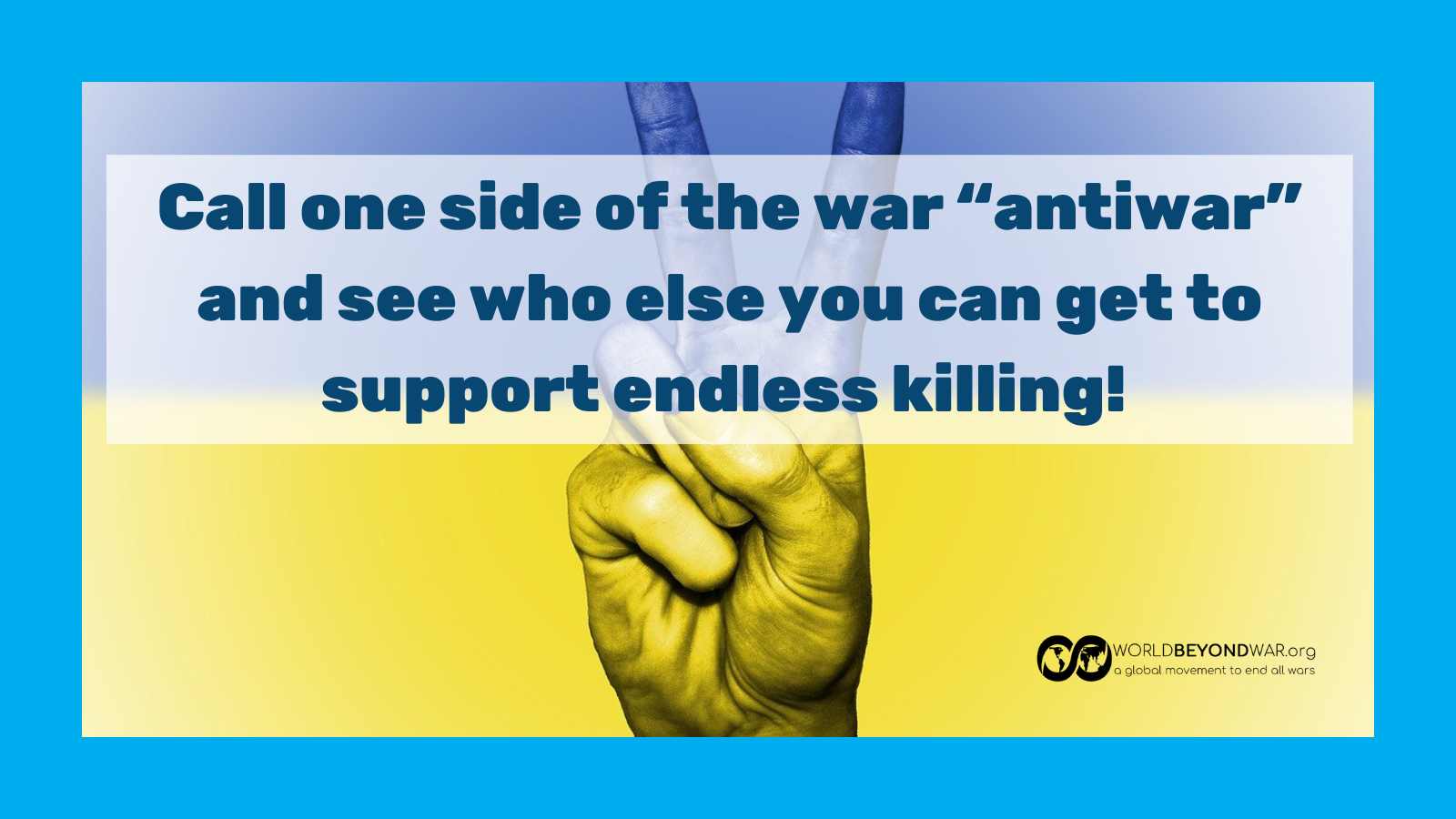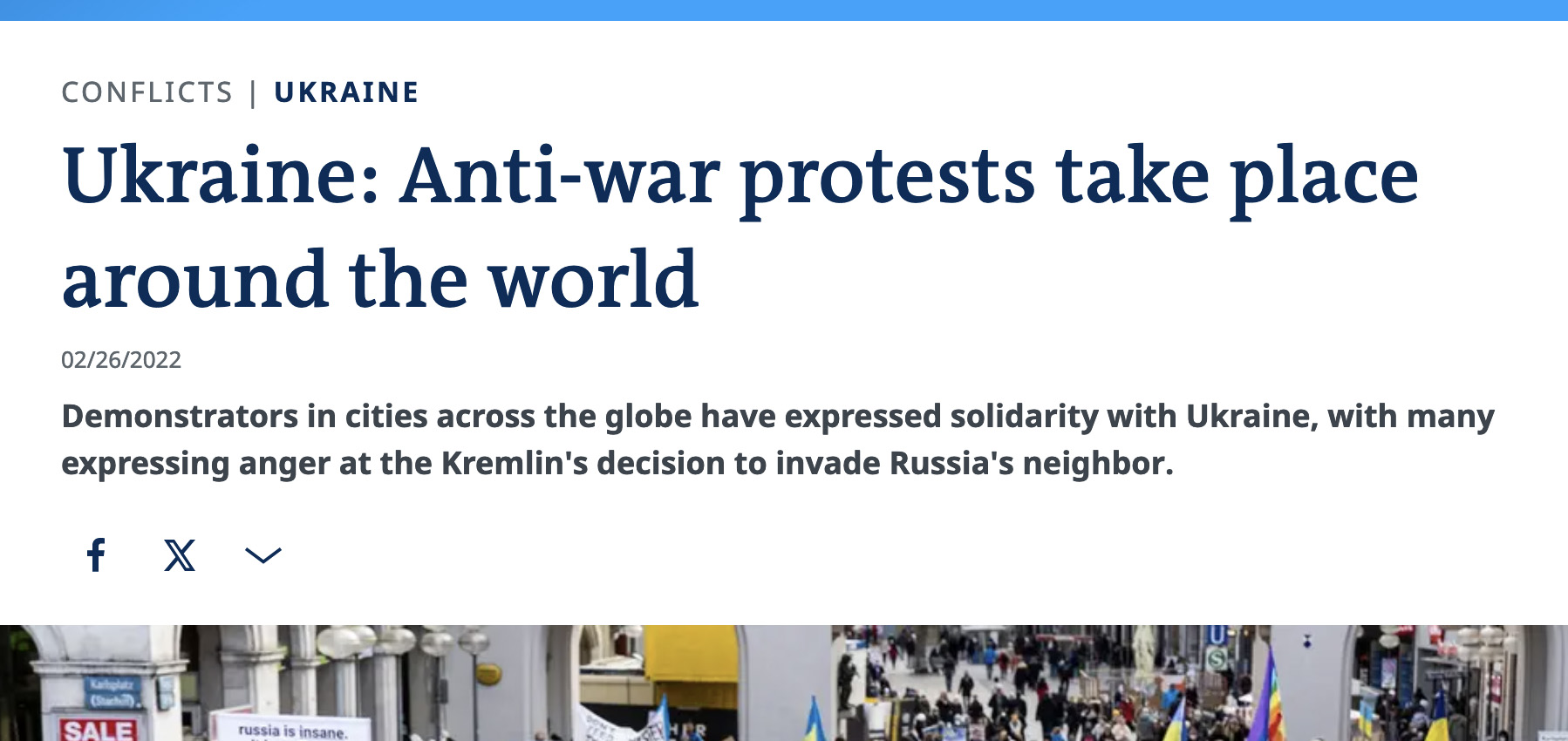
By David Swanson, World BEYOND War, September 13, 2023
Since the day Russia dramatically escalated the war in Ukraine there have been odd conversational confusions. Two people who both claim to oppose the war discover that they oppose opposite sides of the war. Or they discover that one of them opposes both sides of the war (true story, it actually exists, I’m one of them) while the other believes that only Russia is waging war at all, while Ukraine is waging something else entirely.
Since the days when Teddy Roosevelt could advocate for war for its own sake, a certain segment of Western populations has changed. We still have those eager to wage war in Ukraine, or at least to have Ukrainians wage war in Ukraine, and to call it war. Some openly call it a war for NATO expansion, while most call it a defensive and justifiable if not absolutely inevitable war against evil, and of course its quasi-official name: The Unprovoked War. But they still call it a war.
Then there are those who think of war as horrible mass murder (which, of course, it is) and as something that they would never participate in or support. If you describe one of these people, who supports the Ukrainian side of the war, as supporting the Ukrainian side of the war, they will grow quite indignant and explain that only Russia is waging war, that Ukraine is simply fighting and killing, and bragging about the body counts, in order to end Russia’s war. Fighting to end Russia’s war is thus anti-war. In fact, it’s peace work. In addition, it’s socialism. So you will learn. You may find this a nonsensical way to talk. Supporters of the Russian side don’t talk like this, even though they also claim to be doing the defensive, the justifiable, and the inevitable. But, nonsensical or not, this is how leftist-ish supporters of the Ukrainian war-fighting have talked for over a year and a half, and there’s no point in pretending they haven’t.
If you click on a link to a National Public Radio story from April 2022 about a Ukrainian band bringing an anti-war message on a U.S. tour, you will soon discover that it is a pro-war message, although like every other pro-war message in the history of the world, it is against the other side of the war:
The band in question has a video with the words “No War” and “Stop Putin.” The way they intend to stop Putin is, however, with war. I don’t advise listening to the music, which clearly had nothing whatsoever to do with garnering NPR’s approval.
As early as February 2022, as you can read in this Deutsche Welle article, there were pro-war rallies held around the world under the banner of “anti-war.” Here’s the headline:
While such rallies were promoted as anti-war and understood by some as simply expressing sympathy for the victims of war (at least on one side), and while even the article above quotes one person blaming “both sides,” the events were packed with pro-war signs and supporters, and were used by the Ukrainian, U.S., and NATO governments as support for war. President Zelensky thanked people for the support. A photo collection at The Atlantic shows many messages against war (“Stop the War,” “We Want Peace,” etc., but also the subtly different “Stop Putin,” “Stand with Ukraine,” etc.)
One could almost call it a harmless mistake. People oppose a murderous invasion of one country by another. They have no idea what led up to this catastrophe and could not even tell you what unarmed civilian defense means. If they oppose the murderous invasion they are antiwar and also, simply inevitably, pro-war. But they want to communicate clearly, so they’ll need to avoid calling their pro-war position pro-war. After all, they want the war ended. They’ll not do terrorism but counter-terrorism, launch no offenses but only counter-offenses, and wage no war but only unwar.
But after many months of both sides predicting imminent victory while quietly admitting there’s no end in sight, and after many months of seeing both sides refuse to negotiate peace, and in particular after many months of watching Ukraine be prevented from negotiating peace by Western demands and by Western weapons supplies, can it possibly remain honest to go on calling war support “antiwar”?
One group that calls war support antiwar is the so-called Ukraine Solidarity Network, which is supported by various people who have opposed numerous past wars. Just as anyone in the U.S. peace movement knows dozens of people who have supported the Russian invasion of Ukraine, one also knows people who have opposed dozens of wars and now support the Ukrainian side of the war, people like Lawrence Wittner, John Feffer, Bill Fletcher Jr., Rory Fanning, and Howie Hawkins. Of course, the Ukraine Solidarity Network often does admit that Ukraine is waging war. How could it not, when its purpose is precisely to support that war?
“It is urgent to end this war as soon as possible. This can only be achieved through the success of Ukraine’s resistance to Russia’s invasion. Ukraine is fighting a legitimate war of self-defense, indeed a war for its survival as a nation. Calling for ‘peace’ in the abstract is meaningless in these circumstances.”
But this group also advertises its speakers as heading out on antiwar tours. Why would Counterpunch publish a pro-war announcement just because it’s labeled antiwar? Why would Democracy Now invite the speakers on? Maybe The Nation isn’t quite as out of character, but still. One clue may be found in this exchange:
“AMY GOODMAN: . . . . But you’re on an antiwar speaking tour.
“HANNA PEREKHODA: Yeah. Actually, for Ukraine, this is a war of self-defense. And I think it’s very important to make a difference between, you know, the use of violence with the aim of aggression and the use of violence with the aim to protect your own existence. So, this is why in Ukraine, as I said, all the civic and political organizations are united by this consensus that, you know, the political life in Ukraine, for example, the life of the civil society is possible under the — is not possible under the condition of a foreign occupation, an occupation by a foreign army, which actually commit war crimes.”
Of course any consensus in Ukraine comes after mass exodus and intense repression. Democracy Now has also had Yurii Sheliazhenko on their program who is facing criminal prosecution in Ukraine for peace activism — and essentially for opposing both sides of the war, which is (honestly or not) understood by the Ukrainian prosecutors as supporting the Russian side, just as Russian prosecutors would believe it amounted to supporting the Ukrainian side.
But what are we to make of Amy Goodman reading from a press release that her guests are on an antiwar tour, and apparently not having noticed that for a year and a half advocates for the Ukrainian side of the war have called that advocacy “opposing the war”? Goodman could have asked anybody in the actual peace movement, and she would have been forewarned about these particular guests.
I complain about Democracy Now and Counterpunch and The Nation because they are some of the best places for news, and most of the worst places would never have a fake antiwar speaker on, intentionally or otherwise.
If we do start to finally notice that people are calling one side of a war an unwar, we may want to wonder why. Why does the Pentagon have a peace pole in it and claim to kill for peace, whereas never has anyone ever worked for peace and pretended to be working toward the goal of creating war. Maybe I shouldn’t say never. Maybe there’s some exception. Maybe some parliamentarian has pretended to favor war in order to get into a room and advocate peace. There have been phony wars, even the Phony War during World War II, in which declarations of war don’t lead to actual killing and destroying. But never has the belief taken hold that working for cooperation and understanding would be a means of generating mass murder. We now have no wars declared but foregone; instead we have wars waged to the tune of a half million dead accompanied by the pretense that it’s not war at all — and not even “a police action” or some other euphemism, but the opposite of war.
The justification is clearly marketing. You can’t reach the anti-murder demographic by screaming for murder. But this answer just pushes the question down the line. Why do people in that demographic want to tell themselves that war is not war? I think plainly because they know that they are justifying the unjustifiable — even if they do not know exactly how to put a better alternative into words. We need to help them do so.



